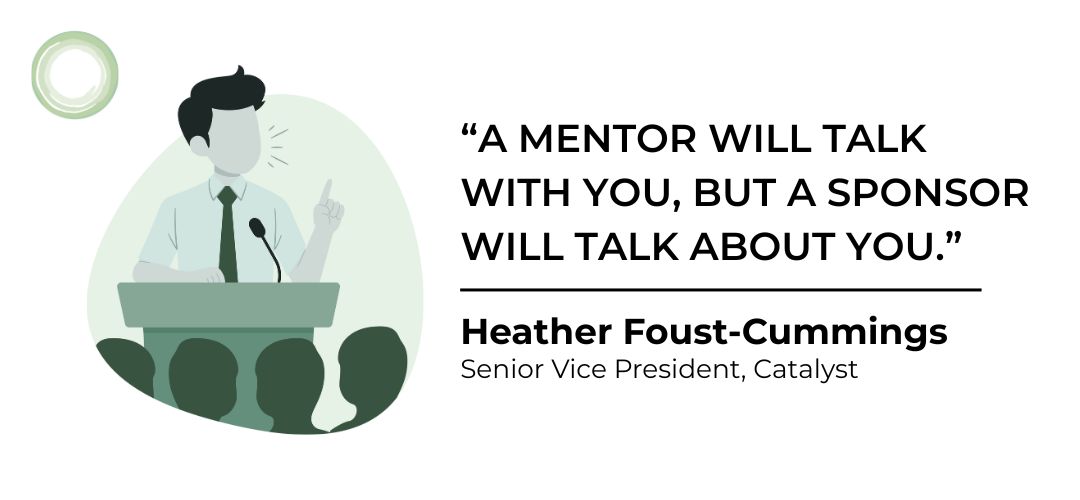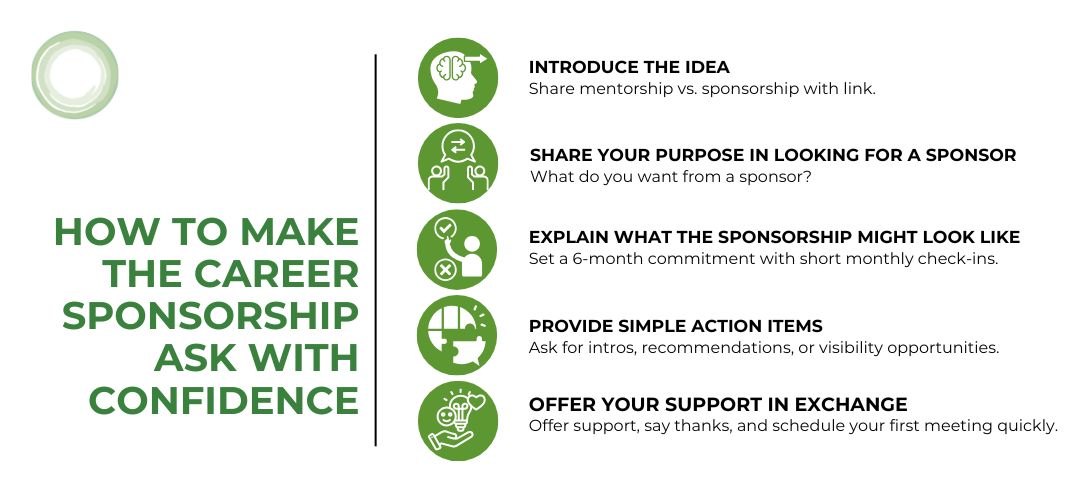I recently led a powerful executive coaching workshop for some of the top women CEOs in biotech who are building up the next generation of leaders. There’s one unmistakable method to advocate for women in the workplace and support their leadership development: sponsorship.
If you’re ready to take the next step in your leadership journey, explore how your Enneagram type influences your leadership style with our Enneagram Applied self-assessment.
After I shared my podcast episode on the importance of sponsoring women in the workplace, I received an overwhelming response from women and men. Today, let’s continue the conversation.
Sponsorship is when a person of influence promotes the achievements, capabilities, and potential of another.
Mentorship, such as leadership coaching, is private, but sponsorship is public. Sponsorship transcends advice and involves making connections, nurturing visibility, and advocating for promotions. Or, as Heather Foust-Cummings, a senior vice president at Catalyst shared with The Muse: “A mentor will talk with you, but a sponsor will talk about you.”

Want to learn how to use this distinction to delegate more effectively and lead with clarity? Check out our Delegate with Confidence resource tailored for emerging and seasoned leaders alike.
Now, let’s walk through how to ask for a career sponsor.
Step 1: How to Identify the Right Career Sponsor for You
1. Understand your purpose
Before you choose your sponsor, you need to understand why you want to work with one. What are your career goals? What assistance are you hoping a sponsor will provide? Reflect on how you want your career to progress–whether it’s toward transformational leadership, team expansion, or broader visibility.
2. Evaluate your options
Look both within and outside your company. Who do you admire and who do you know well?
Be willing to look beyond your comfort zone. An AWIP Future of Women study found that most women and marginalized communities feel drawn to those who resemble themselves. But, as Nancy Wang shared with Forbes, “the right sponsor should also have the necessary clout to make something happen for you; therefore, selecting the right sponsor becomes less of an emotional connection but a professional identification.”
So, why do you want to work with this specific person? How can they benefit you? Who are they connected to? Do you have shared values? How does their career inspire you?
3. Assess your relationship
Has the sponsor seen you in action? Brainstorm with a colleague how you might give the sponsor an opportunity to see your work if the connection is limited. You might consider ideas to build the relationship by joining their committee or a special project they lead. Is there a Lunch-and-Learn you can lead for the sponsor’s team? You may need to strengthen the relationship by considering the person as a mentor and then grow them into a sponsor later after they have an opportunity to see your gifts in action.
If you first need to build a relationship with someone you have in mind and you work at a larger company that has a mentorship program, ask your HR department to facilitate an introduction or a meeting as a mentor. Alternatively, ask someone in your network or your direct supervisor to make an introduction.
Step 2: How to Make the Career Sponsorship Ask with Confidence
Open by expressing your admiration and gratitude. Tell them you respect their work, achievements, and career. Let them know how grateful you are for the relationship.
1. Introduce the idea.
Introduce the idea of mentorship vs. sponsorship. You could mention this article about the difference between the two and even send them a link to this episode.
2. Share your purpose in looking for a sponsor.
How will a sponsor support your career? What do you want from the relationship? Remember, a sponsor can both advance your career and expand your network by providing visibility and connections.
3. Explain what the sponsorship might look like.
Put a time limit on the commitment. People accept responsibilities with end dates; ask if they will sponsor you over the next six months or year.
Then, for example, you might suggest a monthly meeting. You could take an hour for the first meeting to go over your goals and brainstorm how they might help you and who they might introduce you to that would support your goals. From there, you could check in each month for twenty minutes and discuss progress updates.
You want to avoid being (and feeling) like a burden, so keep your meetings short.
The reality is, sponsorship work mostly happens outside of your one-on-ones, as your sponsor has to meet with others on your behalf.
4. Provide simple action items.
Be clear. You want to make this arrangement easy. Your sponsor can start by:
- Introducing you to other key executives
- Recommending you to the head of an important committee
- Inquiring about you showcasing your team’s work at the next company town hall
5. Offer your support in exchange.
Ask if there is anything you can do for your sponsor. Even if they decline at the moment, they will appreciate the gesture of support.
Start your relationship on a positive note. If a sponsor agrees to support you, show your appreciation with a letter of thanks. Also, to stay top-of-mind for your busy sponsor, schedule your first meeting promptly.

Why Advocating for Yourself Is Key to Career Advancement
Your work may impress, but you have to advocate for yourself first, with intention, planning, and patience. Who will be in your corner to support your journey?
It starts with you.
Remember, most people want to help but need to learn what that entails. So come prepared with ideas. You’ll be surprised to find how you can spur your sponsor’s thinking and discover innovative ways to boost your career.
Follow the steps above to find the right sponsor for you.
When you accelerate your career by advocating for yourself, you’ll be surprised to find how many doors will open along the way.
Not sure where to start? Reach out to us to explore custom support for your leadership development or team at Meritage Leadership.
Or register for the Leadership Masterclass with Susan Drumm to gain executive-level insights you won’t find anywhere else.


